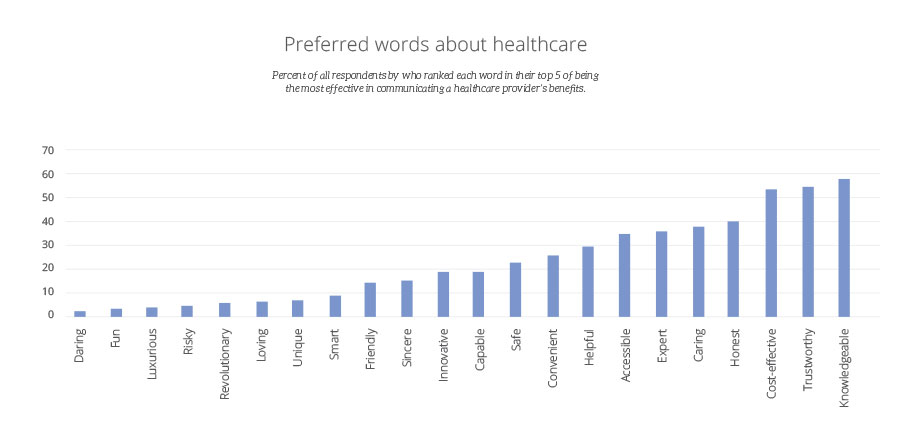Need fresh thinking? Help is a few keystrokes away.
The Top Secret Words for Healthcare Branding
This article is a brief abstract of our exclusive study that takes the guesswork
out of healthcare advertising and marketing.
Download the complete 2017 Southwest Healthcare Marketing Report
Since the dawn of modern advertising, agencies have been known for crafting memorable branding campaigns. From "Bewitched" to "Mad Men," television has depicted agency creative directors searching for the best catchphrase, a memorable jingle and strategic brand messages that resonate with consumers.
To some extent, this hasn’t changed. True, agencies are using modern tactics to spread the word about the health industry. This includes using content marketing, social media marketing and digital marketing in their strategy. But the heart of any healthcare branding campaign remains the search for brand messages which leverage effective brand positioning to communicate the desired consumer experience. What words will drive healthcare consumers to action?

This is especially important for topics related to healthcare, because the stakes are high. Strategic, effective advertising and marketing can help improve a person’s quality of life. If it convinces someone to take action, like a woman getting her first mammogram, an advertising campaign or healthcare branding statement can even save lives.
LAVIDGE has commissioned a survey of consumers throughout the Southwest to take some of the conjecture out of health marketing messaging. Rather than guessing what will appeal to healthcare consumers, we asked them. The results, as shown in the chart above, are telling.
Our healthcare marketing study reveals specific advertising content to use. Doing so will better position your healthcare marketing messages to influence your consumer audience to buy—to visit a hospital, see a physician or purchase health insurance. This is the holy grail of marketing.

Consumers in our study have spoken with clarity, tabbing words they believe will be the most effective in communicating a healthcare provider’s benefits. Download the complete Healthcare Report for the full list.
The winning words aren’t necessarily the news here. Wouldn’t we all want to select a healthcare industry provider that is knowledgeable, trustworthy and cost-effective? The remarkable insight on strategic benefit messaging is how clearly respondents are delineating slight shades between similar words. Is there a significant difference between sincere and honest?

Leave it to consumers to surprise you. At first glance, knowledgeable (58.4%) and smart (9.3%) don’t seem poles apart. They’re almost interchangeable. But our respondents don’t think so. Smart is associated with being intelligent, shrewd and clever. But someone who is knowledgeable exhibits a grasp facts and truths, and displays a deep and specialized familiarity with a particular subject. When it comes to healthcare, you certainly want someone who is smart, but you’d also want to rely on someone with experience who has a significant understanding of their field, such as medicine or health plans.
One of our respondents who chose knowledgeable as their favorite word said, “I want my healthcare provider to be an expert in their field. I want the people who work for them to be smart and knowledgeable regarding the products/coverage provided.” Another said, “You want your doctor to prescribe the best medicine or procedure needed to address your health problem. Mistakes can be very costly.”
The data speaks in a fairly definitive way. The first tier (knowledgeable, trustworthy and cost-effective) towers well above those behind it, and for good reason. These are nuanced words that have slightly different meanings than those we have traditionally seen in healthcare marketing and branding. We suspect that words such as expert, caring and innovative have been overused and may have lost their power. The upgraded gradations of the three words atop the survey have struck a chord. This may be because they have been underused in content for healthcare industry advertising. Together, they create a potent healthcare branding proposition which can give your team a competitive advantage.

We didn’t expect that people would choose a daring, fun or risky health provider, but you don’t know for certain unless you ask. Healthcare is a conservative industry, and it is risk averse. Health consumers are the same way. Few people want their doctor to take chances. We need health insurance, even if it’s just in case.
Additional industry insights from our exclusive study look at how a consumer’s age affects their marketing message preferences. We’ve also unveiled some fascinating details about how a person’s perceived and actual health affects the consumer decision-making process by influencing the kinds of marketing experience they prefer.


